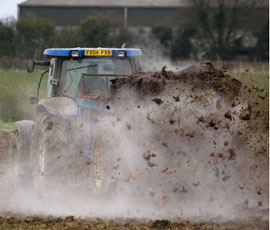Conventional farmers go ‘organic’ to cut costs

Farmers are embracing organic farming techniques as they strive to keep a lid on rising input costs – without actually going organic.
Conventional farmers are showing increasing interest in organic techniques as a means of controlling expenditure on fuel, fertiliser and crop establishment, a breakfast seminar organised by farm business consultants Savills was told.
“More farmers are realising they can improve their farming systems and reduce costs without actually going organic,” Soil Association chief executive Helen Browning told listeners at the Rivenhall Hotel, Essex.
Growers and livestock producers were increasingly looking to reduce nitrogen costs without necessarily compromising profitability. There was also rising interest in soil management, manure management and nutrient cycling.
A rise in inquiries has prompted the Soil Association to set up a special Future Farming programme so organic and non-organic farmers can test new approaches, share existing best practice and sharpen their problem-solving skills.
Up to 100 non-organic farmers are understood to have signed up to the programme.
Funded by the Prince of Wales’s charitable foundation, at the heart of the initiative are farmer-led workshops known as field labs. Hosted by farms trialling new techniques, they enable farmers to meet throughout the season to monitor progress and assess alternative approaches.
Oil and fertiliser prices were both particular areas of concern, said Ms Browning. More farmers were interested in farming using methods under their control, rather than being left to the mercy of prices decided by global markets or a few multinational companies, she said.
“We are very keen to share our knowledge with farmers who will never be organic,” said Ms Browning. “It is possible to improve your farming system and reduce costs without actually going organic and we believe farmers should be in the driving seat of the research agenda.”

